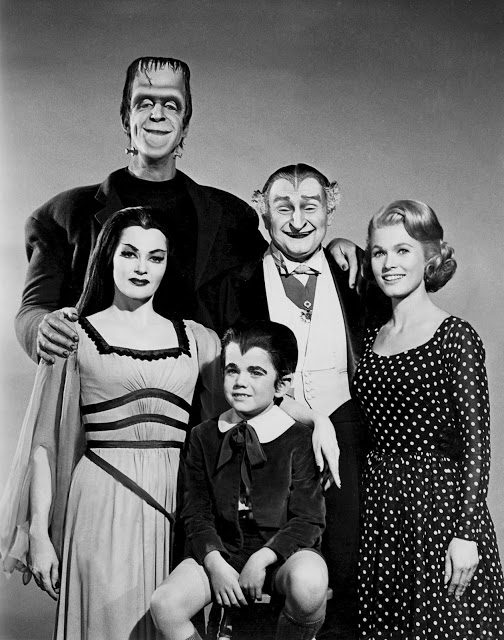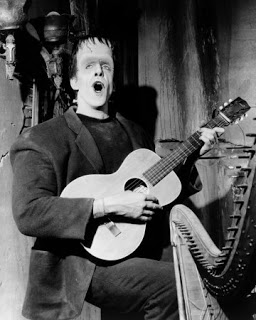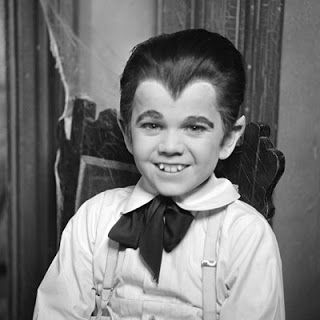The Munsters is my latest Netflix-streaming obsession, to watch all 68 episodes from beginning to end.
Besides getting a plumb education in old-school broad humor, my adult eyes love picking up all the things I never noticed as a child.
Pretty much everyone knows the concept: family of monsters – Herman the Frankenstein monster, Lily and Grandpa the vampires, wolf-boy Eddie – with one non-monster blonde hottie, Marilyn.
But after you get through watching the Munster family scare everyone off, and everyone’s concerns over Marilyn being a spinster burden (hello, 1964!), the blerd in me keeps picking up something else.
At 1313 Mockingbird Lane, Herman and Lily are two working-class people trying to make ends meet, raise their son, look after an elderly parent and care for an orphaned niece.
But outside the house, neighbors complain about how the neighborhood is going downhill “ever since those Munsters moved in.”
A rich couple at a party say the Munsters are rude company and think they’re stuck up. The outside world only tolerates them at a masquerade party, where they’re dressed up like the majority. But as soon as they take the masks off, they’re ridiculed. In other episodes, they’re accepted when of use, and discarded when they get too close.
This all sounds familiar to me, and I didn’t howl at the moon or eat breakfast in a cupboard like Eddie.
All I could think of was what fill-in-the-blank word you could use whenever the normal people say “Munsters.” And how the rich couple might as well have used the word “uppity” because they “don’t know their place.”
The normals are bigots! The normals are the majority, and the Munsters are minorities.
And what’s the root of that bigotry? Fear.
All the normals are deathly afraid of the Munsters.
Continuing the show’s broad humor, their hair stands up and clothes break apart in panic. They hurl themselves through windows and leap up lamp posts like skittish kittens.
On the show it’s played for laughs, because the Munsters are monster creatures.
But watch closely, and they don’t do much in the way of monstrous stuff. Herman frets about bills. Grandpa has get-rich-quick schemes. Lily makes them oatmeal and pancakes for breakfast. They’re just … people.
Growing up with parents who grew up in the shadow of serious, in-your-face racism, I had to be schooled in the fact that white people were going to hate me. In other words, I had to learn what it meant to be black.
So those racist white people who ran the world, they were scary. They’d turn fire hoses on me just for walking into a school?
I have to keep my head on a swivel for racism, even if whites are nice to me?
Especially when whites are nice to you, was the reply I learned. And be careful what you say and do, because white people are watching you.
I learned to fear the white gaze.
That was enough to process when we moved from the all-black ghetto to a part of West Philly where we were the first black family on the block, and going to a racially mixed school for the first time at age 10. That fear was cranked to the max when I went to a private high school in the suburbs, where I was one of about 20 black students out of 550. If some racism ran up on me, I had to be ready to defend my dignity, my pride, my race, my life if necessary.
And what lesson did I learn, early on? It seemed like they were quite afraid of me. Or, if not me specifically, then people who shared my skin tone.
I’d hear it in how schoolmates, sons of the white flight generation, talked about the city. How their parents spoke of the city and the people who lived there. I’d think, “Hey! I’m those city people!”
Or I’d have to play racial ambassador, explaining black people’s mysteries, which almost always came down to me saying, “We’re humans just like you, you know, just with different skin, hair and stuff.”
I just never understood the fear. Especially of me. I’m a black nerd; we’re not known for being threatening.
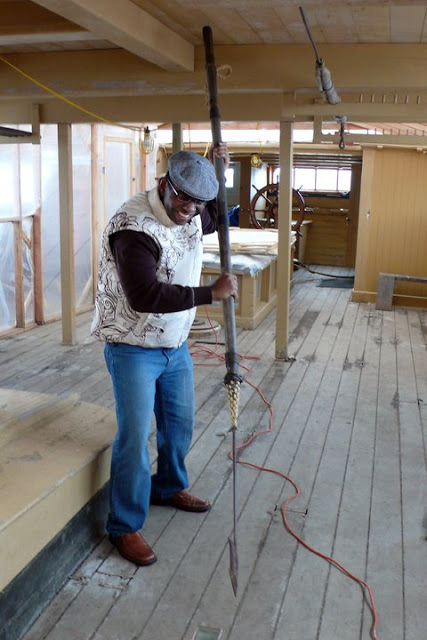 |
| Off to scare some white folks! |
We’re not the street tough or prison-hardened criminal. Not the drug dealer or the glock-sporting gangsta, foul-mouthed rapper or pile-driving athlete. We wear glasses, know about mise-en-scene in Truffaut films, listen to Coltrane albums and watch anime. Nothing threatening there, right?
But, every once in a while, I wish I could be threatening that way. That, just once, I could walk down a street looking all thugged out and make people walk on the other side of the street. But my blerd ass looks ridiculous in Rocawear. It’s true!
Sometimes there’s a pride in scaring white folks. I’ve sat in conversations where black folks caution you on fearing white people’s power, and the next moment then laugh about making them nervous. Especially if you say they did something racist.
But the real satisfaction is when you scare the majority with a truth they don’t want to hear. Martin Luther King was one of the federal government’s most feared men, upsetting the applecart with race relations and the civil rights under the law, then denouncing the Vietnam War and poverty among all people.
So yes, even blerds can be threatening, in a game where knowledge is power. As a black nerd, I took to heart the old maxim: “What’s the scariest thing on Earth? A black man” — usually another word goes there, but ain’t using it — “with a library card.”
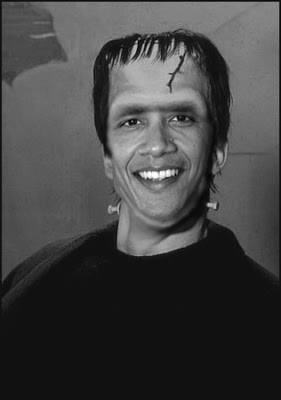 |
| Proof that if you type “Obama Munster” into Google images you get a result |
I’ll never object to putting fear in people’s hearts, if it’s by using my knowledge to speak truth and undo bigotry just by the way I’ve chosen to be black.
Or maybe I should howl at the moon instead. Darn, darn, darn!





































































































